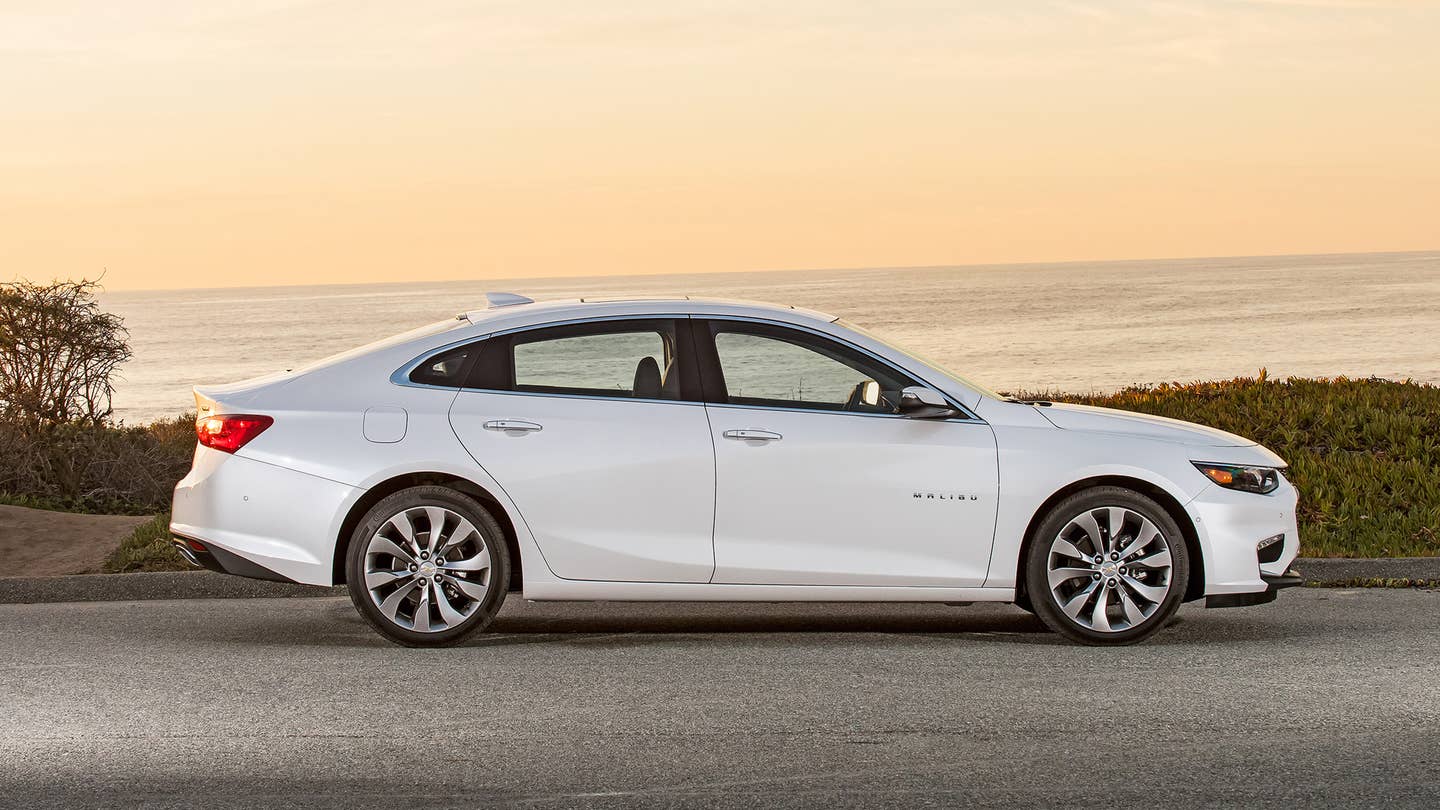Even Being One of Chevy’s Best-Selling Models Couldn’t Save the Malibu
Chevy Malibu sales increased in the last year, yet GM is killing the sedan anyway.

Chevrolet is suspending production of the Malibu—its last sedan standing—in order to retool the assembly plant that currently makes the four-door and clear the way for the upcoming Chevy Bolt. On the surface, this seems like another blow to the sedan segment, which has been on the decline for the last decade or so as full-size trucks and SUVs overtook them in popularity in the U.S. But the death of the Malibu comes despite the sedan having sold over 130,000 examples in 2023, as Automotive News reports.
While the Malibu's sales numbers are not what they once were—and a fair number of them probably go to rental lots—the sedan was nonetheless moving relatively well, sitting as the third best-performing nameplate behind only the Equinox and Silverado over the Bowtie's last calendar year. Malibu sales peaked in 2016, when Chevy moved in excess of 227,000 units of the four-door. Last year's decline of about 97,000 compared to the peak year in the mid-2010s did not bode well for the model, but the sedan managed to actually increase sales in 2023 compared to 2022, when Chevy sold slightly over 115,000 of them. So what gives?
It would make much more sense for Chevy to kill the Malibu if it had been selling as poorly as the recently deposed Subaru Legacy, which saw about 25,500 in sales for 2023. Why would Chevy leave any of those sales on the table?
The carmaker's official statement is that it's for the sake of the new Bolt. Per GM:
As previously announced, GM is investing approximately $390 million in our Fairfax Assembly Plant for production of the new, Ultium-based Chevrolet Bolt EV to deliver one of the most affordable all-electric vehicles with an improved driving, charging and ownership experience.
To facilitate the installation of tooling and other plant modifications, after nine-generations and over 10 million global sales, GM will end production of the Chevrolet Malibu in November 2024 and pause production of the Cadillac XT4 after January 2025. This will result in a layoff until production resumes for affected employees. Affected employees will be supported according to the provisions of the UAW-GM agreement.
When production resumes in late 2025, Fairfax will produce both the Bolt EV and XT4 on the same assembly line, which gives GM flexibility to respond to changes in customer demand.
GM plans on clearing the way for EVs at the current site of Malibu production at Kansas City's Fairfax Assembly and Stamping. The plant also makes the Cadillac XT4—another crossover—though production of the Caddy will be paused next year. It won't resume again until the plant is ready to start making the upcoming Bolt alongside the gas-burning Cadillac.
While the party line from GM is all about the Malibu dying off so the Bolt can be built in Fairfax, it still makes little sense if the ICE-powered XT4 will be produced at the same site. The only thing left to point to is that the XT4 is a crossover—and a "luxurious" one at that—while the Malibu is a lowly (read: less lucrative) sedan.
The cynical read is that the Malibu's death could have something to do with sedans yielding slimmer profit margins, as full-size pickups and crossovers tend to make more money for manufacturers. For reference, Chevy shifted 555,000 Silverados in 2023, while the Chevy Equinox reached nearly 213,000 in sales. And the sunsetting of the Malibu badge ostensibly has mostly to do with Chevy's great expectations for the next-generation Bolt EV, which GM is invested in to the tune of $390 million.
This isn't the first time that Chevy has decided to kill the Malibu: the car's original production run lasted nearly two decades, from 1964 through 1983. That timeframe saw the release of four Malibu generations, but the car wouldn't make a comeback until 1997 when the front-wheel-drive Malibu made a triumphant debut and took Motor Trend's Car of the Year award.
The fifth-gen Malibu spurred on another four generations (for a total of nine) that saw ongoing production for another 27 years, outdoing the Malibu's first production run. Indeed, it looked like the stalwart Chevy would endure the great sedan extinction of the last few years. But it seems that even if it could have lived through that based on sales alone, the Malibu is dying so the new Bolt may live.
I have nearly no qualms with a solid ICE-equipped sedan dying off for the sake of an affordable EV, but I wish GM would hurry up and make an inexpensive EV sedan, as opposed to the crossover(ish) Chevy Bolt. The U.S. desperately needs small, cheap EVs, and the Tesla Model 3 desperately needs a rival from the Big 3.
